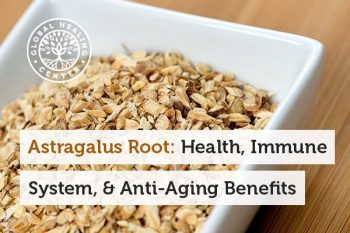April 4th, 2018
Guest writer for Wake Up World
Astragalus root is an herb that’s tremendously important in traditional Chinese medicine. It is known for its many health benefits, especially its potential to slow the aging process. Research has revealed this herb may have the ability to encourage healthy function of the heart, lungs, kidneys, and liver. It has also been shown to support normal cholesterol and blood pressure and encourage a healthy response to psychological stress. Because of its many qualities, astragalus root is frequently used to enhance therapies for various health issues.[1]
What Is Astragalus Root?
Astragalus root comes from the astragalus, or Astragalus membranaceus, plant, which is native to China. There are more than 2,000 species of this plant. Also called Mongolian milkvetch and huáng qí, this hairy-stemmed plant grows year-round and is celebrated for the beneficial flavonoids––plant-based molecules with antioxidant properties––contained within its root. Astragalus root has been used in traditional Chinese medicine for centuries and has more recently become a popular herbal remedy and nutritional supplement in the United States.[1, 2]
What Are the Benefits of Astragalus Root?
- Boosts the immune system
- Has anti-aging properties
- Reduces the effects of stress
- Promotes heart health
- Helps break down arterial plaque
- Encourages balanced cholesterol levels
- Encourages normal blood sugar levels
- Supports normal kidney function
- Helps detox and protect the liver
- Supports healthy cell cycles
A primary benefit of astragalus root is as an adaptogen – a natural substance that works with a person’s body to regulate the effects of stress and fatigue. In this way, astragalus root can protect the body from emotional, physical, and mental stress. Additionally, studies have shown a positive effect on respiratory health, seasonal wellness, cardiovascular health, and more. It’s this herb’s impact on the immune system and its antioxidant qualities that enable it to support the health of so many organs and reduce the effects of aging.[3]
Anti-Aging
The chromosomes that hold your DNA are bound by structures called telomeres. During cell division, telomeres shorten and signal a stop in cellular growth called cellular senescence, which can lead to aging and illness. T cells, which are part of the immune system, activate the enzyme telomerase. This enzyme fixes and extends the telomeres, helping the life of the cell. Extracts from astragalus root have been shown to activate telomerase activity in human T cells, resulting in healthier cell longevity and function.[4]
Aside from activating the telomerase enzyme, astragalus slows the aging process by protecting mitochondria. By reducing or eliminating harmful free radicals from cells, damage may be reduced or reversed, slowing the aging process. Many anti-aging beauty creams are formulated with astragalus root.[5, 6]
Anti-Stress
Whether it’s because of a poor diet, lack of sleep, environmental toxins, or even emotional or physical challenges, everyone experiences stress from time to time. Whenever you get “stressed-out,” a systemic change happens in your body from the release of stress hormones. This change leads to a weaker immune system and an imbalance in your gut microflora. Astragalus root, being an adaptogen, can help the body normalize itself or “adapt” to different types of stress or physical changes. Studies show that astragalus root helps reduce the effects of stress by encouraging balanced levels of cortisol, the stress hormone.[7, 8]
Heart Health
Your heart is the motor that pumps nutrient-rich blood throughout your body to supply your organs and keep them in working condition. This vital organ can become unhealthy and develop issues when exposed to certain toxins or illnesses.
The rise in unhealthy diets and sedentary lifestyles in Western cultures has led to a greater incidence of heart conditions. Studies on cardiovascular health have increased as well, with growing attention on traditional Chinese medicine. Much of this research is focused on astragalus root and its benefits for heart health. Studies suggest that its cardioprotective nutrients, namely the flavonoids and polysaccharides, support artery health and the immune system. Clinical trials showed a marked difference in patients with heart conditions when specific servings of astragalus root extract were given.[9, 10]
Blood Vessel Health
Damaged arteries are often the result of high blood pressure. A buildup of plaque that contains fat, cholesterol, and calcium can severely affect cardiovascular health. Over time, plaque can cause calcification, which hardens the arteries and makes it difficult for blood to flow properly. The buildup of plaque also narrows the arteries and eventually causes the blockage that leads to serious health issues.[11] The soothing qualities of astragalus root help break down arterial plaque and encourage balanced cholesterol levels.[12]
Blood Glucose Health
Glucose is the sugar in your blood that is responsible for distributing energy to the cells in your body. Your pancreas makes insulin, a hormone that helps glucose enter cells. Sometimes, certain cells in your body resist the effects of insulin, a condition called “insulin resistance.” As a result, the pancreas produces more insulin until, eventually, it has a hard time producing more of this important hormone. With little to no insulin being made, your glucose is unable to enter cells and starts to accumulate in your body. This process can lead to health issues such as type 2 diabetes.[13] Preliminary research suggests that astragalus root encourages normal blood sugar levels and positive results have been observed in studies on astragalus’ effect on insulin regulation.[14, 15]
Kidney Health
Your kidneys are part of your immune system. They filter excess water and waste from the blood to be expelled in urine. Your kidneys also keep your body’s minerals and salts in balance and produce hormones that make red blood cells. Health issues such as diabetes and high blood pressure can damage the kidneys. Performing a natural kidney cleanse is a great way to support normal kidney health. Some research shows that astragalus root extract may help increase the iron-rich protein, hemoglobin, in red blood cells and decrease proteinuria––a harmful amount of protein in the urine. More research is needed, but studies do suggest that astragalus root provides nutrients that support normal kidney function.[16]
Liver Health
Like the kidneys, your liver is part of your immune system. It detoxifies the blood and contains cells that can digest cellular debris and old, worn-out blood cells.[17] When the liver accumulates toxins or becomes damaged, it affects your immune system and makes it difficult for your body to perform its most basic detoxification functions. A liver cleanse is a good approach to supporting normal liver health. Astragalus root can be a helpful supplement during a cleanse because its natural, immune-boosting qualities may help detox and protect the liver.[18]
Cell Cycle Health
The cells in your body are constantly growing and dividing. Sometimes the regulation of cells is disturbed, and the cell’s normal growth and behavior stop. Studies performed using extracts of astragalus root have revealed an increase in the cells lining the walls of your arteries, known as endothelial cells. Researchers continue to study how astragalus root may support healthy cell cycles for overall wellness.[19]
How Is Astragalus Root Consumed?
Astragalus root is most commonly available in capsule and tablet form, or as a liquid extract. Astragalus tea, made by steeping the shavings of the root in hot water, is another popular way to get this herb into the body. Sometimes, in clinical settings when severe health conditions are present, astragalus root may even be injected.[1] Additionally, astragalus root is a common ingredient in anti-aging lotions, creams, and ointments. Its natural soothing properties make it a useful alternative to harsh topical ointments.[20]
Safety and Side Effects
By itself, clinical trials have not shown any evidence of toxicity related to astragalus root extracts. Observed side effects are minimal and may include diarrhea and other gastrointestinal issues.[21] As with all herbs, care should be exercised before mixing astragalus root with other herbal supplements or medications, especially those that lower the immune system. Very little is known about the effects of astragalus root during pregnancy and it’s always critical to ask your healthcare provider before taking any supplement while pregnant.[22]
Is Astragalus Root Right for You?
If you like the health benefits associated with astragalus root and want to support your immune system and overall vitality, then it may be right for you. Ask your healthcare professional and work with them to determine a serving size and method that’s right for you.
If you’re looking for a supplement that contains astragalus root, consider Cell Fuzion, an advanced antioxidant formula designed to protect and energize mitochondrial function, sustain healthy cell cycles, and guard against DNA damage. It may also help regenerate the body’s natural intracellular antioxidants.
Have you tried astragalus root? What was your experience? We’d love to hear from you. Tell us your story in the comments section below, or join the conversation on Facebook.
References:
- Ehrlich S. “Astragalus.” University of Maryland Medical Center. umm.edu. 24 March 2015. Accessed 12 Dec. 2017.
- Shannon D, et al. “Adaptation of Astragalus membranaceus varieties to Southeastern United States: Growth, Root Development and Astragaloside IV Content.” Journal of Medicinal Plants Studies. 2014;2(3), 80-91 ISSN: 2320-3862. Accessed 12 Dec. 2017.
- Huang Y, et al. “Astragalus membranaceus-Polysaccharides Ameliorates Obesity, Hepatic Steatosis, Neuroinflammation and Cognition Impairment without Affecting Amyloid Deposition in Metabolically Stressed APPswe/PS1dE9 Mice.” Int J Mol Sci. 2017;18(12). pii: E2746. Accessed 12 Dec. 2017.
- Molgora B, et al. “Functional Assessment of Pharmacological Telomerase Activators in Human T cells.” Cells. 2013; 2(1), 57–66. Accessed 12 Dec. 2017.
- Xing-Tai L, et al. “Mitochondrial Protection and Anti-aging Activity of Astragalus Polysaccharides and Their Potential Mechanism.” Int J Mol Sci. 2012;13(2), 1747–1761. Accessed 12 Dec. 2017.
- Herndon J, et al. “An Open Label Clinical Trial of a Multi-Ingredient Anti-Aging Moisturizer Designed to Improve the Appearance of Facial Skin.” J Drugs Dermatol. 2015;14(7), 699-704. Accessed 13 Dec. 2017.
- Kelly G. “Nutritional and botanical interventions to assist with the adaptation to stress.” Altern Med Rev. 1999;4(4), 249-65. Accessed 14 Dec. 2017.
- Hyun-Jung P, et al. “The Effects of Astragalus Membranaceus on Repeated Restraint Stress-induced Biochemical and Behavioral Responses.” Korean J Physiol Pharmacol. 2009; 13(4), 315–319. Accessed 13 Dec. 2017.
- Yang Q, et al. “Clinical effect of Astragalus granule of different dosages on quality of life in patients with chronic heart failure.” Chin J Integr Med. 201;17(2), 146-9. Accessed 13 Dec. 2017.
- Jiang D, et al. “Milkvetch root improves immune function in patients with acute exacerbation of COPD.” Biomed Mater Eng. 2015;26(1), S2113-21. Accessed 13 Dec. 2017.
- “Atherosclerosis.” American Heart Association. heart.org. 2017. Accessed 13 Dec. 2017.
- Zhang G, et al. “Effects of Astragalus membranaceus root processed to different particle sizes on growth performance, antioxidant status, and serum metabolites of broiler chickens.” Poult Sci. 2013;92(1), 178-83. Accessed 13 Dec. 2017.
- “Symptoms & causes of diabetes: What are the symptoms of diabetes?” NIDDK. nih.gov. 2016. Accessed 13 Dec. 2017.
- Ju J, et al. “Astragalus polysaccharides improve cardiomyopathy in STZ-induced diabetic mice and heterozygous (SOD2+/-) knockout mice.” Braz J Med Biol Res. 2017;10;50(8), e6204. Accessed 13 Dec. 2014.
- Liu M, et al. “Astragalus polysaccharide improves insulin sensitivity in KKAy mice: regulation of PKB/GLUT4 signaling in skeletal muscle.” J Ethnopharmacol. 2010;127(1), 32-7. Accessed 13 Dec. 2107.
- Zhang H, et al. “Astragalus (a traditional Chinese medicine) for treating chronic kidney disease.” Cochrane Database of Systematic Reviews 2014;10;(008369). Accessed 13 Dec. 2017.
- “How does the liver work?” PubMed Health. nih.gov. 22 Aug. 2016. Accessed 14 Dec. 2017.
- Zhou Y, et al. “Synergistic anti-liver fibrosis actions of total astragalus saponins and glycyrrhizic acid via TGF-?1/Smads signaling pathway modulation.” J Ethnopharmacol. 2016;190, 83-90. Accessed 14 Dec. 2017.
- Lai P, et al. “Induction of Angiogenesis in Zebrafish Embryos and Proliferation of Endothelial Cells by an Active Fraction Isolated from the Root of Astragalus membranaceus using Bioassay-guided Fractionation.” J Tradit Complement Med. 2014;4(4), 239-45. Accessed 15 Dec. 2017.
- Shenefelt PD. “Herbal Treatment for Dermatologic Disorders.” In: Benzie IFF, Wachtel-Galor S, editors. “Herbal Medicine: Biomolecular and Clinical Aspects.” 2nd edition. Boca Raton (FL): CRC Press/Taylor & Francis; 2011. Chapter 18. Accessd 15 Dec. 2017.
- Song J, et al. “Safety evaluation of Astragalus extract mixture HT042 and its constituent herbs in Sprague-Dawley rats.” Phytomedicine. 2017;32, 59-67. Accessed 15 Dec. 2017.
- Wang R, et al. “Effect of ingredients of Astragalus-Salvia compound on vascular endothelial cell in placenta and vascular endothelial growth factor mRNA expression in trophocyte in pregnant rats with inhibited nitric oxide synthesis.” Zhongguo Zhong Xi Yi Jie He Za Zhi. 2005;25(6), 516-9.
Recommended articles by Dr. Edward Group:
- The 9 Best Fermented Foods for Your Gut
- 14 Foods that Cleanse the Liver
- Top 5 Foods for the Pineal Gland
- The Importance of a Kidney Cleansing Diet
- The 9 Best Herbs for Lung Cleansing and Respiratory Support
- 7 Best Foods to Support Kidney Function
- Lung Cleansing With Peppermint Oil
- 20 Health Benefits of Fasting for Whole Body Wellness
- How Fluoride Damages Pineal Gland Health
- Toxin Cleanse: Which Toxins Are Disrupting Your Health?
- How Does the Alkaline Diet Affect Gut Health?
About the author:
Dr. Edward F. Group III (DC, ND, DACBN, DCBCN, DABFM) founded Global Healing Center in 1998 with the goal of providing the highest quality natural health information and products. He is world-renowned for his research on the root cause of disease. Under his leadership, Global Healing Center earned recognition as one of the largest natural and organic health resources in the world. Dr. Group is a veteran of the United States Army and has attended both Harvard and MIT business schools. He is a best-selling author and a frequent guest on radio and television programs, documentary films, and in major publications.
Dr. Group centers his philosophy around the understanding that the root cause of disease stems from the accumulation of toxins in the body and is exacerbated by daily exposure to a toxic living environment. He believes it is his personal mission to teach and promote philosophies that produce good health, a clean environment, and positive thinking. This, he believes, can restore happiness and love to the world.
For more, please visit Global Healing Center.

If you've ever found value in our articles, we'd greatly appreciate your support by purchasing Mindful Meditation Techniques for Kids - A Practical Guide for Adults to Empower Kids with the Gift of Inner Peace and Resilience for Life.
In the spirit of mindfulness, we encourage you to choose the paperback version. Delve into its pages away from screen glare and notifications, allowing yourself to fully immerse in the transformative practices within. The physical book enriches the learning process and serves as a tangible commitment to mindfulness, easily shared among family and friends.
Over the past few years, Wake Up World has faced significant online censorship, impacting our financial ability to stay online. Instead of soliciting donations, we're exploring win-win solutions with our readers to remain financially viable. Moving into book publishing, we hope to secure ongoing funds to continue our mission. With over 8,500 articles published in the past 13 years, we are committed to keeping our content free and accessible to everyone, without resorting to a paywall.









